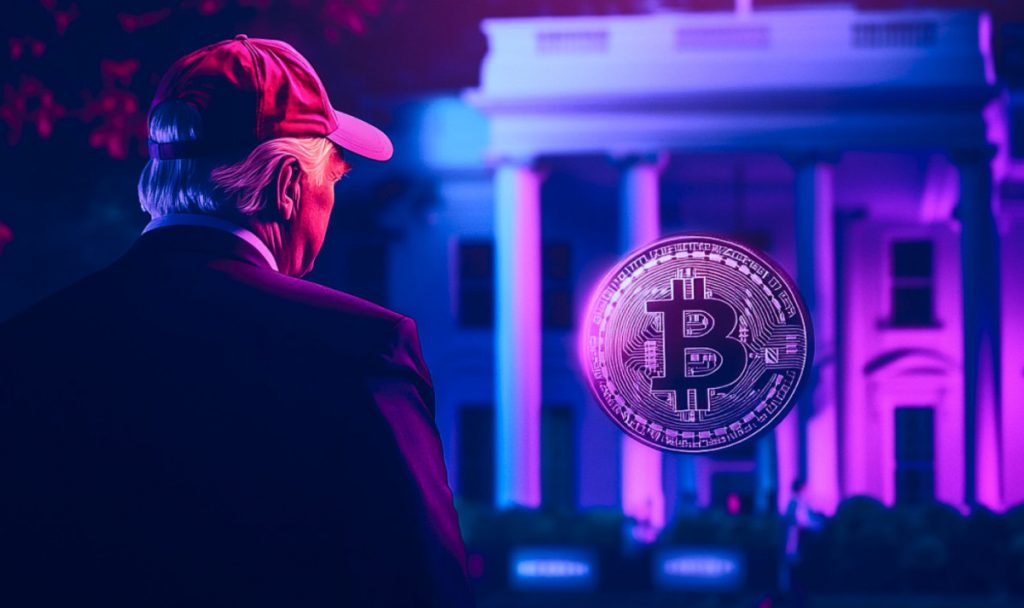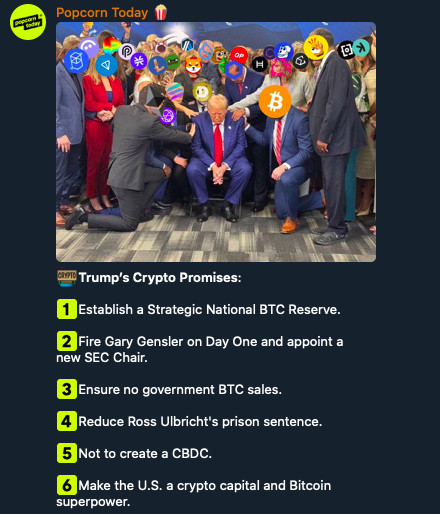As Trump Wins a Second Term, Cryptocurrency Markets Surge with Unprecedented Bullish Momentum Driven by Regulatory Hopes


In Brief
Trump’s 2024 election victory has sparked a surge in the cryptocurrency industry, with the Trump administration promoting decentralized finance and potentially transforming the market.

With former President Donald Trump winning a second term in office, the 2024 U.S. presidential election gave the cryptocurrency industry fresh life. Trump is well-known for his pro-business views and his recent embrace of digital assets. His win is seen as having the potential to transform the crypto market.
The Trump administration has hinted at policies that may be against CBDCs and in favor of decentralized finance. Numerous digital assets, ranging from Dogecoin to Bitcoin, have experienced notable volatility and record-high valuations as markets respond to the outcome.
Market Response to Trump’s Win
The crypto market experienced notable increases in the immediate aftermath of the election results. The bullish feeling among investors and the expectation of a crypto-friendly climate under Trump’s administration were both factors in Bitcoin’s climb to a record $75,000. Trump’s rhetoric and actions have continuously moved toward regulatory leniency for digital assets, which many investors view as an opportunity for the sector to continue growing and innovating.

Photo: CoinGecko
It was not just Bitcoin that experienced a rise. Massive rises were also made by memecoins like Dogecoin and Shiba Inu. Dogecoin surged about 30% as a result of rumors that Trump might choose Elon Musk, the CEO of Tesla and a strong advocate for Dogecoin, for a federal government job, potentially increasing the exposure and power of some digital assets in governmental structures.

Photo: CoinGecko
This rise highlights a larger pattern: Investor confidence seems to have increased as a result of Trump’s alleged openness toward cryptocurrency. Many believe that the administration’s anticipated position will encourage further investment, strengthening institutional and retail participation in the market.
Trump’s Cryptocurrency Policy Agenda
The business is energized by the possibility of Trump’s crypto policies. With policies like supportive legislation, strategic incorporation of Bitcoin into national assets, and opposition to centralized digital currencies, Trump’s campaign pledges point to an agenda that would actively assist the cryptocurrency sector.

Photo: Popcorn Today
An Important National Asset – Bitcoin
One of Trump’s most talked-about aspects of his cryptocurrency program is his proposal to create a Bitcoin “strategic reserve.” He suggested making Bitcoin a national asset and keeping it in government reserves throughout his campaign. This move could potentially increase Bitcoin’s status from a speculative asset to a strategic, inflation-resistant resource akin to gold.
Should the U.S. government decide to hoard Bitcoin, it might serve as a model for other nations to follow suit. By decreasing its supply in circulation and increasing its allure as a store of wealth, such a move may raise the price of Bitcoin. Additionally, if other countries decide to establish their own digital currency reserves, this strategy would encourage a new kind of international monetary rivalry.
Establishment of an Advisory Council for Crypto
The creation of a presidential advisory group on cryptocurrencies is part of Trump’s plan. This council would include of prominent crypto activists and business executives with the goal of creating laws “authored by people who understand and support the industry.” In order to reduce regulatory concerns and promote innovation, U.S. crypto policy might be guided by a council of industry insiders.
The advisory council would probably concentrate on important topics including institutional rules for crypto investment, tax treatment for digital assets, and security laws for digital assets. This strategy may promote a cooperative regulatory environment by giving industry-led recommendations priority, which would be advantageous for both well-established firms and up-and-coming blockchain businesses.
Disapproval of Digital Currencies Issued by Central Banks
Trump’s criticism of CBDCs, which he characterizes as a “threat to freedom,” is another defining feature of his suggested crypto policy. Trump has expressed worries about the centralization dangers of CBDCs, including diminished personal financial privacy and possible government monitoring of individual transactions. His administration may postpone or stop the Federal Reserve from launching a U.S. digital dollar, a proposal that has caused controversy in the cryptocurrency world if it maintains this stance.
Trump’s backing of decentralized cryptocurrencies, as opposed to CBDCs, may establish the United States as a major force in the global cryptocurrency market, attracting supporters of DeFi and self-sovereignty over money.
Consequences of Appointing Pro-Crypto Regulatory Officials
It is anticipated that Trump’s victory will result in new nominations to federal regulatory agencies, including the Commodity Futures Trading Commission (CFTC) and the Securities and Exchange Commission (SEC). His government may choose officials who support cryptocurrencies, which would enable more transparent regulations and attract institutional investment.
The sector may witness fewer enforcement actions and more defined lines between security and utility tokens as a result of crypto supporters perhaps occupying important regulatory posts. This might reduce entrance barriers and spur innovation by streamlining procedures for cryptocurrency startups looking to comply. Additionally, Trump’s regulatory decisions can create an environment in which institutional investors feel comfortable investing more in digital assets.
Impact Worldwide and American Leadership in Crypto
There may be repercussions on a global scale from Trump’s goal to make the United States the “crypto capital of the planet.” In response, other nations may enact more crypto-friendly laws in an effort to catch up to the United States. Initiatives like tax reductions for cryptocurrency businesses, funding for blockchain research, and incorporating blockchain into public services are all part of this strategy.
The Trump administration has the potential to set a worldwide standard for how countries interact with digital assets if it implements policies that position the United States as a crypto center. The adoption of cryptocurrencies by developing nations as a tool of financial inclusion and economic progress may be encouraged by the United States embrace of cryptocurrencies as a mainstream financial sector.
Threats and Difficulties to Trump’s Crypto Policies
Trump’s pro-crypto policies have a lot of potential advantages, but there are also a number of obstacles to overcome. The state of the economy, regulatory complexity, and legislative approval are some of the main challenges.
Trump’s crypto proposals will need the backing of Congress in order to be implemented. Lawmakers worried about threats to the established financial system may oppose his more ambitious plans, such as creating a national Bitcoin reserve. Other pro-crypto policies, such as tax breaks for blockchain startups and regulatory changes, may also be closely examined by Congress.
It could be difficult for Trump’s administration to carry out its crypto agenda in its entirety without bipartisan backing. The degree to which his policy agenda is realized will probably depend on the level of congressional acceptance.
Regardless of Trump’s policies, the overall state of the economy will continue to have an impact on the cryptocurrency market. Some experts are concerned that broad crypto regulations might put more financial burden on the economy in light of growing inflation and worries about the national debt. Because of its volatility, cryptocurrencies are susceptible to changes in economic policies, particularly those pertaining to inflation and interest rates.
The trajectory of cryptocurrency is also influenced by global economic factors, such as trade dynamics and geopolitical conflicts. Unpredictable market dynamics may make it difficult for Trump’s government to strike a balance between economic stability and cryptocurrency innovation.
Even with Trump’s support for cryptocurrency, the sector continues to confront legal obstacles. The market is unpredictable because to ongoing legal disputes between crypto companies and regulatory bodies, such as the SEC’s actions against certain digital assets. There could be challenges for Trump’s government in defining token categories, protecting consumers, and bringing international crypto standards into line.
Institutional and Mainstream Adoption
Increased institutional adoption of the sector may result from pro-crypto regulatory appointments and advantageous policies. To make it simpler for regular investors to access digital assets, banks may increase their crypto custody offerings, and financial institutions may establish crypto trading desks. The launch of new cryptocurrency investment products, such as mutual funds and ETFs, may also be aided by less regulatory uncertainty.
More varied cryptocurrency payment alternatives may result from widespread use, increasing the accessibility of digital assets in regular transactions. Trump’s pledge to create a welcoming regulatory framework may help the US enter the mainstream cryptocurrency market and increase people’s comfort and knowledge of digital assets.
Although the future of cryptocurrency under Trump’s administration is uncertain, the first indications point to a promising course. His initiatives, if put into effect, may pave the way for fresh ideas, more institutional participation, and wider acceptance, establishing the United States as a leader in the world of cryptocurrency.
Disclaimer
In line with the Trust Project guidelines, please note that the information provided on this page is not intended to be and should not be interpreted as legal, tax, investment, financial, or any other form of advice. It is important to only invest what you can afford to lose and to seek independent financial advice if you have any doubts. For further information, we suggest referring to the terms and conditions as well as the help and support pages provided by the issuer or advertiser. MetaversePost is committed to accurate, unbiased reporting, but market conditions are subject to change without notice.
About The Author
Victoria is a writer on a variety of technology topics including Web3.0, AI and cryptocurrencies. Her extensive experience allows her to write insightful articles for the wider audience.
More articles

Victoria is a writer on a variety of technology topics including Web3.0, AI and cryptocurrencies. Her extensive experience allows her to write insightful articles for the wider audience.


















































